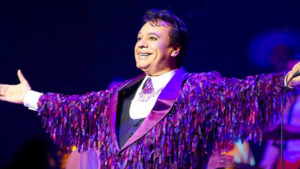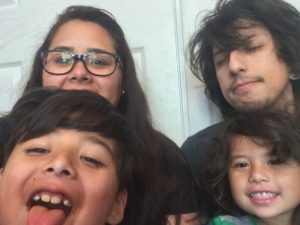In the piece titled “El Plan Espiritual de Aztlan” there was an emphasis on “Organizational Goals” that are needed in order to achieve Chicana/o independence. There were seven goals in total but I will be linking the first set of goals and to Chicana feminism and the piece by Segura and Pierce “Chicana/o Family Structure and Gender Personality”. The conceptualization of the Chicana/o family is the strong male figure as the head and the submissive woman on the side. As we saw in the film “Chicana” the Chicana/o movement of the 60s and 70s was resistant to accept Chicana feminist thought, women were expected to play the role of the submissive and self sacrificing mother. Men were considered the head of the house and therefore part of the public sphere whereas women were part of the private sphere and focused on the undervalued domestic work. Authors Segura and Pierce note that much like the public sphere controls the private sphere, men control women. However, the goals of “El Plan Espiritual de Aztlan” set forth to gain independence through unity, economic control and education. Although these goals are important to both men and women, these goals are able to make the most difference in the lives of Chicana mothers. One key aspect of the Chicana/o culture is the big extended families. Mothers, like those in the film “Chicana”, rely on the support of their families in order to accomplish the goals they set for themselves. Even more so mothers rely on family to help fulfill their roles as mothers, CSUDH has a record number of student mothers. Although we, for I myself am a mother of two, are no strangers to the demands of the second shift, we rely on grandmas, ninas, tias, and other strong men and women in our lives to provide our children with the care and mothering they need while we work and go to school. Education, is also an a goal for Chicana/o independence which resonates with Chicana mothers. Once again CSUDH has a large Chicana mother student population. Higher education is important not just for better earning potential, but also for growing a strong base of awareness of, and resistance to oppression. Lastly, I want to cover the importance of economic oppression in the lives of Chicana mothers, once again we need to be reminded that oppression of any kind can have devastating effects but it is the combined effects of patriarchy and racism that leave Chicana mothers most vulnerable. We see the construction of submissive and self sacrificing mother seems to justify the economic oppression of the Chicana mothers. Whether we are unemployed, underemployed, over worked and/or underpaid mothers are a highly exploited work force. Without economic stability Chicana mothers often stay in abusive relationships, struggle to get an education, and are left at the mercy of broken social safety nets. This is yet another reason why Chicana mothers rely heavily on the extended family in order to survive.
Author Archives: erubalcavamedina1
Juan Gabriel and gender identity.

In the article “Chicana/o Family Structure and Gender Personality” there is emphasis placed on the notion that “mothering occurs in a social context” and that mothers reproduce gender identities. As a child you learn what is feminine and what is masculine within the context of your family, particularly from your mother because she is believed to be responsible for the upbringing of children. In the article authors Segura and Pierce explain that while “mothers are directly responsible for teaching their daughters how to be Chicanas”, additionally mothers are teaching Chicano boys that they should identify themselves as “being not female”. At a very early age boys are taught that ideal man is “feo, fuerte y formal”. This bring to mind the image of recently deceased artist Juan Gabriel. In an op-ed piece titled “As a boy, I was taught to ridicule Juan Gabriel. As an adult I revered him” author Arellano speaks of his own experience with gender and group identity. Arellano remembers how growing up phrases like “Juanga” were meant to be derogatory and aimed towards boys who were “perceived to be being gay”. Although being gay is still highly controversial in our culture I would make note of that fact that men like Juan Gabriel who push the boundaries of what it means to be a man are helping spark change in society. With his recent death fans both male and female from across the globe are reaching out to pay respect to an amazing artist, setting aside homophobia. While many are still persecuted for their non-traditional gender identity, Juan Gabriel was openly gay and unapologetic. It is the constant push back on idealized and rigid gender identities that is helping create a more tolerable society.
http://www.latimes.com/opinion/op-ed/la-oe-arellano-juan-gabriel-20160829-snap-story.html
esmeralda

Hello everyone I’m esmeralda. I have taken Chicano/a studies courses in the past and have found them very interesting. I am taking this one for personal growth. I want to note that although I am proud to consider myself a Chicana it has not always been easy for me. Like most of CSUDH students, it is a big sacrifice to be here with you today but I keep pushing myself as a form of personal resistance. I feel that just recently I have been able to find some clarity in life. Growing up my life was marked by stress of extremes and now I push myself to compromise and find self acceptance. One vivid memory I have of these extremes is in relation to my skin color. On my mother’s side of the family everyone is a fair skinned whereas my dad’s side of the family is quite tanned. Growing up my I had aunts from my mother’s side who constantly made distasteful comments about my dark complexion. As a child I had no idea how to process this, and wouldn’t dare disrespect my aunts and stand up for myself, so with time I became very ashamed about my dark skin. For many years I suffered from depression and avoided sun exposure at all costs. In the heat of summer I would wear long sleeve shirts and pants to “protect” my skin from the sun. I also tried as much as possible to stay indoors. It wasn’t until I saw a picture of myself that I was startled to see my yellowish complexion that I finally gave up! At that point I remember this incredible sense of frustration and disappointment. It was after many years of mental health services (I don’t want to give off the wrong impression that the color of my skin the only reason I suffered from depression, it was a combination of several issues) that I was finally able to come to terms with who I am and I am glad to say that I was finally able to speak up for myself and my children, now when or if my aunts make a distasteful comment about my complexion of the complexion of my children I rather rudely remind them that having white skin is not a talent and I affirm myself and my kids by saying that I love our darker complexion I let them know it is very beautiful. I even joke with them by asking: when you go buy a roasted chicken what would you rather get a pale chicken or a golden brown chicken?

